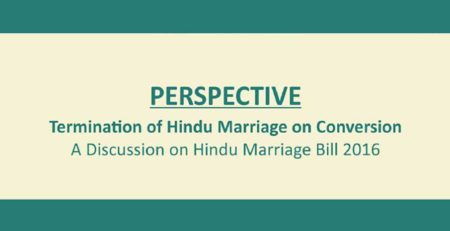The Law of Tawhin-i-Risalat: A Social, Political and Historical Perspective
The law: an historical analysis
By now it must have been clear that the law of Tawhin‑i Risalat, as enforced in Pakistan, is neither religious bigotry nor fanaticism on the part of the Muslims of Pakistan. Nor is it an imposition on the legal system of the country caused by any particular interest group. This is perfectly in line with the traditions of Islam and matches the consistent Muslim perception about this problem.3
Before we proceed with an elaboration of the legal and theological principles on which the law is based, we should examine the provisions of the law itself. It may be pointed out here that the Pakistan Penal Code enforced in 1860 includes an independent chapter (Chapter XV) dealing with offenses relating to religion, meaning thereby that religious offenses were acknowledged as criminal acts by the British author of the Penal code as far back as 1860.
The chapter originally consisted of four sections, namely, 295, 296, 297 and 298, dealing with injuring or defiling places of worship with intent to insult the religion of any class, disturbing religious assembly, trespassing the burial places, and uttering words with deliberate intent to injure religious feelings. These sections have been on the statutes book for more than 134 years with hundreds of cases decided under them. The basic concepts embodied in these sections have been discussed at length, analyzed threadbare and interpreted minutely by different courts at different levels not only in British Indian courts but also in Privy Council. Thus, there is no ambiguity in interpreting and applying such terms as injuring or defiling or insulting religious beliefs.
After the enforcement of these sections in 1860, it was felt that the sections were inadequate to cope with the situation resulting out of the growing religious sensitivities of various communities in British India. New sections were added to this chapter at various stages not only during the British days but also after independence in 1947. It will not be out of place to reproduce the original sections of the chapter:
{niftybox background=#F2F2F2}
295. Injuring or defiling place of worship, with intent to insult the religion of any class: Whoever destroys, damages or defiles any place of worship, or any object held sacred by any class of persons with the intentions of thereby insulting the religion of any class of persons or with the knowledge that any class of persons is likely to consider such destruction, damage or defilement as an insult to their religion, shall be punished with imprisonment of either description for a term which may extend to two years, or with fine, or with both.
296. Disturbing religious assembly: Whoever voluntarily causes disturbance to any assembly lawfully engaged in the performance of religious worship, or religious ceremonies, shall be punished with imprisonment of either description for a term which may extend to one year, or with fine, or with both.
297. Trespassing on burial places, etc: Whoever, with the intention of wounding the feelings of any person, or of insulting the religion of any person, or with the knowledge that the feelings of any person are likely to be wounded, or that the religion of any person is likely to be insulted thereby, commits any trespass in any place of worship or on any place of sculpture, or any place set apart for the performance of funeral rites or as a depository for the remains of the dead, or offers any indignity to any human corpse or causes disturbance to any persons assembled for the performance of funeral ceremonies, shall be punished with imprisonment of either description for a term which may extend to one year, or with fine, or with both.
298. Uttering words, etc., with deliberate intent to wound religious feelings: Whoever, with the deliberate intention of wounding the religious feelings of any person, utters any word or makes any sound in the hearing of that person or makes any gesture in the right of that person or places any object in the sight of that person, shall be punished with imprisonment of either description for a term which may extend to one year, or with fine, or with both.
{/niftybox}
Long and high sounding as the preceding sections are, these are basically law‑and‑order instruments developed by a colonial secular regime to ensure peace in the empire rather than the protection of any religious message or ideology.
It shall also be noted that these sections contain all those basic elements that are now being subjected to criticism on various pretexts after their insertion in the code as section 295‑C. It is said that the terms “insult” and “defile” are ambiguous and pregnant with possibilities of misinterpretations and wrong applications. It is also claimed that the limitations placed on a person’s right to insult or to defile a religious personality is violative of the human rights guaranteed in the constitution. But the fact that such provisions with these “ambiguous” and “undefined” terms have been on the statute book for the last 134 years without creating the difficulties now being anticipated should be enough to conclude that the terms shall be misinterpreted nor wrongly applied.
During the British period itself, the colonial government felt the need to widen the scope of this chapter through an amendment in 1927, which is as follows:
{niftybox background=#F2F2F2}
295‑A. Deliberate and malicious acts intended to outrage religious feelings of any class by insulting its religion or religious beliefs: Whoever, with deliberate and malicious intention of outraging the religious feelings of any class of the citizens of Pakistan, by words, either spoken or written, or by visible representations insults the religion or religious beliefs of that class, shall be punished with imprisonment of either description for a term which may extend to two years, or with fine, or with both.
{/niftybox}
The scope of the chapter was further enlarged after Pakistan came into being as an independent state. This expansion was more in the nature of elaborating the original law than anything else. We reproduce here the new sections in a chronological order.
In 1982, PPC (Amendment) Ordinance I of 1982 Section added 295‑B. It reads as follows:
{niftybox background=#F2F2F2}
295‑B. Defiling, etc., of The Holy Qur’an: Whoever willfully defiles, damages or desecrates a copy of the Holy Qur’an or of an extract therefrom or uses it in any derogatory manner or for any unlawful purpose shall be punishable with imprisonment for life.
{/niftybox}
In 1984, new sections were inserted to the existing chapter to provide a more effective deterrent for the sanctity of the person of Prophet Muhammad (‘alayhi assalām) and the finality of his prophethood. This was a major step in the direction of having a law in keeping with centuries old traditions and norms of the Muslims who have always unanimously held that the crime of insulting the Prophet amounts to a high treason in Islam and is liable to death punishment.
In order to give effect to the Fourth Constitutional Amendment of 1974 and to provide for the consequential amendment (promised and resolved by the two houses of Parliament at the time of the Amendment), the following three sections were enacted and enforced through an ordinance known as the Anti‑Islamic Activities of the Qaudiani Group, Lahori Group and Ahmadis (Prohibition and Punishment) Ordinance, XX of 1984:
{niftybox background=#F2F2F2}
298‑A. Use of derogatory remarks, etc., in respect of holy personages: Whoever by words, either spoken or written or by visible representation, or by any imputation, innuendo or insinuation, directly or indirectly, defiles the sacred name of any wife (Umm al-Mūmineen), or members of the family (Ahle‑bait), of the Holy Prophet (peace be upon him), or any of the righteous Caliphs (Khulafa‑e‑Rashideen) or Companions (Sahaba) of the Holy Prophet (peace be upon him) shall be punished with imprisonment of either description for a term which may extend to three years, or with fine, or with both.
298‑B. Misuse of epithets, descriptions and titles, etc., reserved for certain holy personages or places:
(1) Any person of the Quadiani group or the Lahori group (who call themselves (Ahmadis) or by any other name) who by words, either spoken or written, or by visible representation,
(a) refers to, or addresses any person, other than a Caliph or Companion of the Holy Prophet Muhammad (peace be upon him), as “Ameer‑ul‑Mumineen,” Khalifa‑tul‑Mumineen,” Khalifat-ul‑Muslimeen,” “Sahaabi” or “Razi Allah Anhu”;
(b) refers to, or addresses, any person, other than a wife of the Holy Prophet Muhammad (peace be upon him ), as “Ummul Mumineen;”
(c) refers to, or addresses, any person, other than a member of the family “Ahle‑bait” of the Holy Prophet Muhammad (peace be upon him), as “Ahle‑bait”’ or
(d) refers to, or names, or calls, his place of worship as “Masjid”; shall be punished with imprisonment of either description for a term which may extend to three years, and shall also be liable to fine.
(2) Any person of the Quadiani group or Lahori group (who call themselves “Ahmadis” or by any other name) who refers to the mode or form of call to prayers followed by his faith as “Azan,” or recites Azan as used by the Muslims, shall be punished with imprisonment of either description for a term which may extend to three years, and shall also be liable to fine.
298‑C. Person of Quadiani group, etc., calling himself a Muslim or preaching or propagating his faith: Any person of the Quadiani group or the Lahori group (who call themselves ‘Ahmadis’ or by any other name) who, directly or indirectly, poses himself as a Muslim, or calls, or refers to, his faith as Islam, or preaches or propagates his faith, or invites others to accept his faith, by words, either spoken or written, or by visible representations, or in any manner whatsoever outrages the religious feelings of Muslims, shall be punished with imprisonment of either description for a term which may extend to three years and shall also be liable to fine.
{/niftybox}
Finally in 1986, Majlis ashShura (parliament) unanimously enacted the Criminal Law (Amendment) Act III of 1986 whereby the protection earlier given to religion, religious beliefs, places of worship, the Companions and the wives of the Holy Prophet of Islam was also extended to the person of the Prophet whose reference gives sanctity and veneration to these personalities. Accordingly, Section 295‑C was inserted in the PPC:
{niftybox background=#F2F2F2}
295‑C. Use of derogatory remarks, etc., in respect of the Holy Prophet: Whoever by words, either spoken or written, or by visible representation, or by any imputation, innuendo, or insinuation, directly or indirectly, defiles the sacred name of the Holy Prophet Muhammad (peace be upon him) shall be punished with death, or imprisonment for life, and shall also be liable to fine.
{/niftybox}
This law, however, provided for two alternative punishments, namely, death punishment and imprisonment for life. A group of senior lawyers and jurists challenged it in the Federal Shari‘ah Court. The court heard the petition for quite some time and invited a number of scholars and jurists to assist it by submitting their views on the subject. On October 30, 1990, the court gave a unanimous judgment declaring that the alternative punishment of imprisonment for life for the crime of insulting the Prophet and defiling his sacred name is violative of the injunctions of Islam and hence opposed to the shari‘ah. The government preferred an appeal in the Supreme Court not to challenge the judgment itself but to seek some clarification on some of the biter dicta in the judgment.
In the mean time, a new government came to power, which withdrew the appeal from the Supreme Court. Some people criticized this action of the government and expressed their reservations on the death punishment, which they thought was harsh. These reservations were, however, not received favorably by the masses. Not only leaders of public opinion but also elected bodies and legislative assemblies voiced their sentiments. On June 2, 1992, the National Assembly passed a unanimous resolution asking the government to provide death penalty for insulting the Prophet. The Senate also followed suit and on July 8, 1992 unanimously passed the amendment bill to incorporate death sentence as the only punishment for this crime. The fact that the legislative measure embodied the collective conscience of the Pakistani people made this law as one of the most representative legal instruments in the history of our nation.






